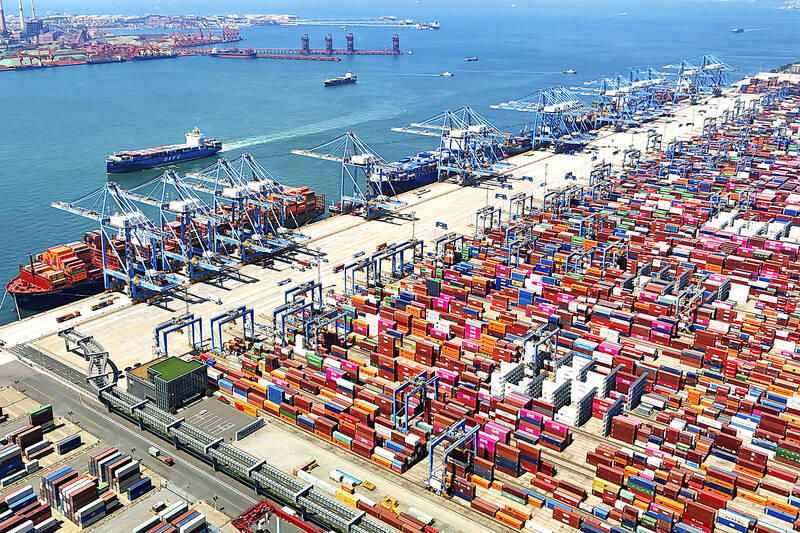China’s export growth surged last month to the fastest since July 2022, extending a months-long boost to the economy that may be jeopardized by Donald Trump’s reelection and his tariff threats.
Exports rose 12.7 percent from a year earlier to US$309 billion, the Chinese General Administration of Customs said yesterday, significantly exceeding any economist’s forecast.
The trade surplus in the month climbed to the third-highest on record, as factories ramped up shipments ahead of Christmas holidays and likely in anticipation of worsening trade tensions.

Photo: Chinatopix via AP
“This may partly be driven by exporters trying to front-load shipments in order to mitigate the damage of a potential trade war next year,” said Zhang Zhiwei (張智威), president and chief economist at Pinpoint Asset Management Ltd (保銀私募基金管理). “I think the economy will improve modestly in the fourth quarter, but the trade war may start in the first quarter of next year. We cannot rely on exports to carry China’s economy.”
The strength in exports — their value grew in all but one of the last 12 months — has helped make up for sluggish domestic demand, but that outpouring of cheap products has also sparked a backlash. In response, the US, South America and Europe, among others, have raised tariff barriers against goods such as steel and electric vehicles.
China yesterday slashed the daily reference rate for its currency to the weakest in almost a year, a sign its central bank is allowing depreciation under the threat of an escalated trade war with the US. A weaker yuan boosts the competitiveness of Chinese exporters.
Last month, exports to the US rose 8.1 percent, the most in three months. Shipments to most markets climbed, with double-digit increases to Asean, the European Union, South Africa and Brazil. Shipments to Russia jumped almost 27 percent, the fastest growth this year.
Trump’s return to the White House will further complicate the outlook. The president-elect has threatened to put tariffs of as much as 60 percent on Chinese goods, a level that Bloomberg Economics predicts will decimate trade between the world’s biggest economies.
Any new barriers would mean China might need to find new markets for the products it currently sells to the US. Last year, Chinese companies shipped US$500 billion in goods to America, accounting for 15 percent of the value of all its exports.
Huang Zichun (黃子春), China economist for Capital Economics, said those levies would hurt China’s export sector, but he expects emerging markets to offset a sizable portion of the loss in demand from the US.
“Their impact would be less significant than many fear – we think they could lower export volumes by around 3 percent – and may not be felt until the second half of 2025,” Huang wrote in a note.

When an apartment comes up for rent in Germany’s big cities, hundreds of prospective tenants often queue down the street to view it, but the acute shortage of affordable housing is getting scant attention ahead of today’s snap general election. “Housing is one of the main problems for people, but nobody talks about it, nobody takes it seriously,” said Andreas Ibel, president of Build Europe, an association representing housing developers. Migration and the sluggish economy top the list of voters’ concerns, but analysts say housing policy fails to break through as returns on investment take time to register, making the

‘SILVER LINING’: Although the news caused TSMC to fall on the local market, an analyst said that as tariffs are not set to go into effect until April, there is still time for negotiations US President Donald Trump on Tuesday said that he would likely impose tariffs on semiconductor, automobile and pharmaceutical imports of about 25 percent, with an announcement coming as soon as April 2 in a move that would represent a dramatic widening of the US leader’s trade war. “I probably will tell you that on April 2, but it’ll be in the neighborhood of 25 percent,” Trump told reporters at his Mar-a-Lago club when asked about his plan for auto tariffs. Asked about similar levies on pharmaceutical drugs and semiconductors, the president said that “it’ll be 25 percent and higher, and it’ll

NOT TO WORRY: Some people are concerned funds might continue moving out of the country, but the central bank said financial account outflows are not unusual in Taiwan Taiwan’s outbound investments hit a new high last year due to investments made by contract chipmaker Taiwan Semiconductor Manufacturing Co (TSMC, 台積電) and other major manufacturers to boost global expansion, the central bank said on Thursday. The net increase in outbound investments last year reached a record US$21.05 billion, while the net increase in outbound investments by Taiwanese residents reached a record US$31.98 billion, central bank data showed. Chen Fei-wen (陳斐紋), deputy director of the central bank’s Department of Economic Research, said the increase was largely due to TSMC’s efforts to expand production in the US and Japan. Investments by Vanguard International

WARNING SHOT: The US president has threatened to impose 25 percent tariffs on all imported vehicles, and similar or higher duties on pharmaceuticals and semiconductors US President Donald Trump on Wednesday suggested that a trade deal with China was “possible” — a key target in the US leader’s tariffs policy. The US in 2020 had already agreed to “a great trade deal with China” and a new deal was “possible,” Trump said. Trump said he expected Chinese President Xi Jinping (習近平) to visit the US, without giving a timeline for his trip. Trump also said that he was talking to China about TikTok, as the US seeks to broker a sale of the popular app owned by Chinese firm ByteDance Ltd (字節跳動). Trump last week said that he had